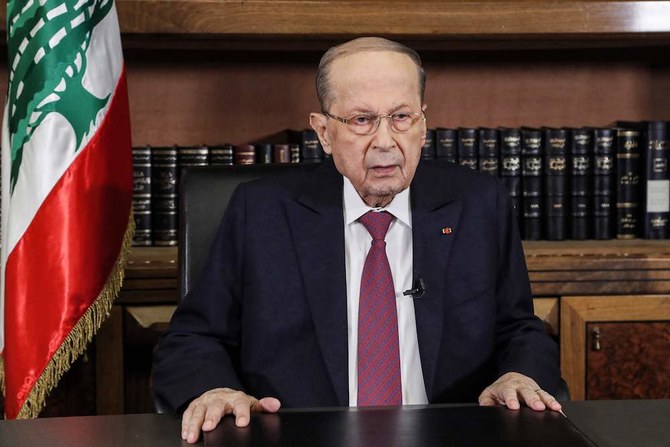Lebanese President Michel Aoun on Monday night criticized Hezbollah, without mentioning the party by name, for disrupting the work of the government.
“It is true that defending the homeland requires cooperation between the army, the people and the resistance, but the primary responsibility rests with the state,” Aoun said during a televised speech.
“Only the state sets the defense strategy and ensures its implementation. Before reaching this point, it must stop deliberate, systematic and unjustified disruption that leads to the dismantling of institutions and the dissolution of the state.”
Aoun also affirmed his desire for “the best relations with Arab countries, particularly with the Gulf states,” and asked: “What is the justification for straining relations with these countries and interfering in matters that do not concern us?”
The alliance between the president’s Free Patriotic Movement party and Hezbollah was strained last week when the Constitutional Council rejected an appeal submitted by the FPM against amendments to electoral laws that were approved by the Lebanese parliament but are opposed by Aoun’s team. The appeal would have limited the right of expatriates to vote, by limiting them to voting for six new seats specifically for non-residents rather than existing seats in the 128-member legislature.
In a speech following the council’s decision, FPM leader Gibran Bassil denounced Hezbollah. It had been expected that Aoun would be similarly critical of the party and blame it for the disruption of government.
Earlier on Monday, Interior Minister Bassam Mawlawi announced that he had signed a decree to hold parliamentary elections on May 15. Parliament had recommended the election take place on March 27, but Aoun objected to this date and demanded it be moved to May.
In his speech, the president called for “an urgent national dialogue for understanding on three issues: The expanded administrative and financial decentralization, the defense strategy, and the plan for financial and economic recovery.”
While keen to avoid a complete breakdown of relations with Hezbollah, he indirectly accused the party of responsibility for disrupting the operations of the state.
“I do not want to quarrel with anyone, neither people nor parties, and I do not want to dismantle the unity of any sect,” Aoun said.
But he added that he would not “accept to be a witness to the fall of the state and suffocation of people, and I will continue to work until the last day of my tenure and the last day of my life to prevent this.
“The solution lies through dialogue and peaceful means, and its beginning is in the meeting and work of the Council of Ministers and all state institutions.”
He stressed that “it is necessary for the government to meet today … and the parliament should monitor its work and not contribute to its disruption. The disruption of the government is responsible for the paralysis of the administration.”
The president stressed that “only the state sets and implements the defense strategy, and the deliberate, systematic and unjustified obstruction must stop.”
Aoun criticized the disruption to the state caused by demands by Hezbollah and the Amal movement to halt Judge Tarek Bitar’s investigation into the causes of the Beirut port explosion in August 2020.
“By which Shariah, logic or constitution is the council of ministers suspended and it is asked to take a decision that is not within its powers, and its work is suspended due to an issue that does not constitute a charter dispute?” he asked
He concluded by saying that he was delivering “a frank message and I hope I will not have to say more.”
Aoun’s speech coincided with a campaign on social media and news sites in protest against incidents on the road to Beirut airport, where Hezbollah has raised banners and images in support of Iran’s leaders, in particular former commander of the Islamic Revolutionary Guard Corps’ Quds Force, Qassem Soleimani, in the run-up to the second anniversary of his assassination by a US drone strike on Jan. 3, 2020.
Activists describe the banners and photos as a “provocative scene for every Lebanese, and specifically for Lebanese expatriates returning to Lebanon for the holidays.”

